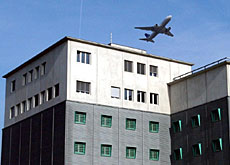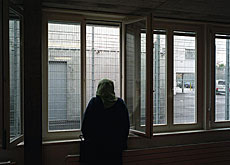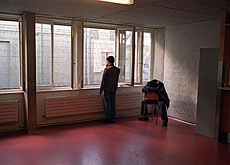Parliament adopts tough new asylum law

The Swiss parliament has approved controversial new laws on asylum seekers and foreigners, which the political left aims to challenge in a nationwide vote.
Under the new laws, rejected asylum seekers would no longer receive social welfare payments and could be detained for up to 18 months before deportation.
The legislation, which has taken three years to prepare, was officially adopted by both houses of parliament on Friday morning.
Despite opposition from the left, the House of Representatives passed the revised asylum law by 108 votes to 69, and the law on foreigners by 106 to 66. The Senate approved them by a similar majority.
The centre-left Social Democrats and the Green Party confirmed on Friday that they would launch referendums against both laws and would begin collecting the necessary signatures this month.
They believe the asylum law breaches the constitution and international law. Both parties are backed by churches and humanitarian organisations.
In September the United Nations refugee agency (UNHCR) voiced “serious concerns” about moves to introduce a more restrictive asylum law.
The Geneva-based UNHCR said that some of the planned measures would make Swiss legislation among the most severe in Europe.
The tightening of Switzerland’s asylum law was masterminded by Justice Minister Christoph Blocher of the rightwing People’s Party.
Supporters of the changes, including the centre-right Christian Democrats and the Radical Party, believe they will provide better protection against abuse of the asylum system.
Crackdown
The measures are designed to crack down on rejected asylum seekers and illegal immigrants, and reduce costs. The number of asylum applications in Switzerland has been falling steadily and is now at its lowest since 1987.
Asylum applicants without identity papers would have to prove that they are not responsible for the situation.
The UNHCR is particularly concerned that only valid travel documents or identity papers would be accepted. It said many asylum seekers were not able to obtain such papers before fleeing their countries.
In another change, rejected asylum seekers would have their social welfare payments stopped. The aim is to speed up deportation of rejected asylum seekers.
However, cantons will be allocated SFr15,000 ($11,640) per case, to enable them to provide emergency assistance to rejected asylum seekers who are still in the country.
Under the new law, the maximum detention period for foreigners awaiting deportation would increase to 18 months for adults and nine months for minors over 15.
It also contains new restrictions on family reunification. Asylum seekers admitted on a provisional basis would not have the right to bring their families to Switzerland until three years had passed.
swissinfo with agencies
In the 11 months to the end of November 2005, 9,256 people entered the asylum process. That represents a 31 per cent drop on the same period last year.
Positive decisions: 1,313 (-8%)
Negative decisions: 6,349 (-32%)
Repatriations (includes applicants from previous years): 1,190 (-45%)
The number of completed cases fell by 29 per cent to 13,000.

In compliance with the JTI standards
More: SWI swissinfo.ch certified by the Journalism Trust Initiative


You can find an overview of ongoing debates with our journalists here. Please join us!
If you want to start a conversation about a topic raised in this article or want to report factual errors, email us at english@swissinfo.ch.